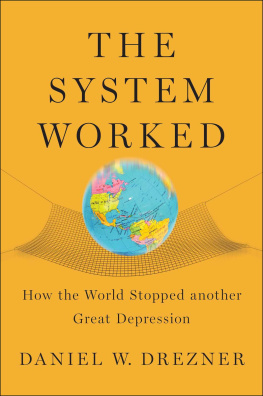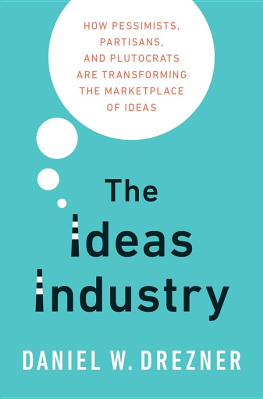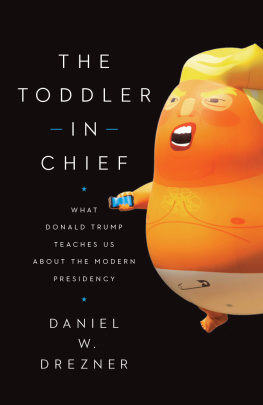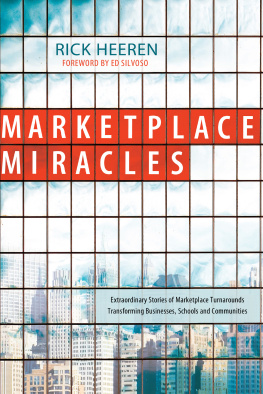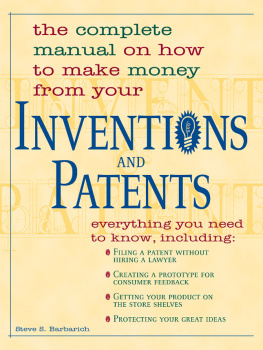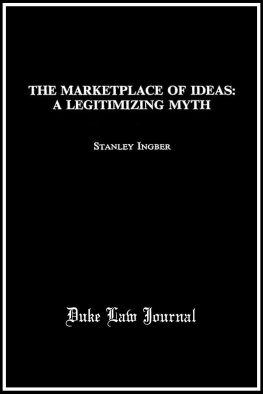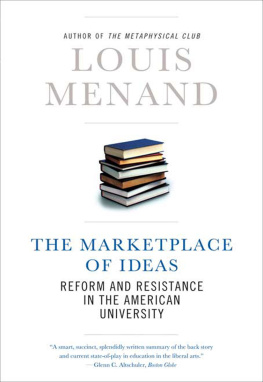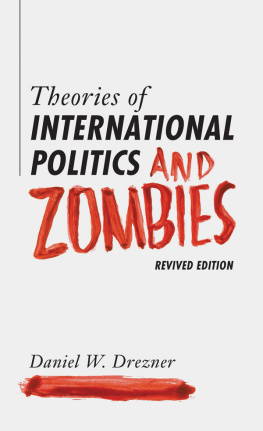Daniel W. Drezner - The Ideas Industry
Here you can read online Daniel W. Drezner - The Ideas Industry full text of the book (entire story) in english for free. Download pdf and epub, get meaning, cover and reviews about this ebook. year: 2017, publisher: Oxford University Press, genre: Politics. Description of the work, (preface) as well as reviews are available. Best literature library LitArk.com created for fans of good reading and offers a wide selection of genres:
Romance novel
Science fiction
Adventure
Detective
Science
History
Home and family
Prose
Art
Politics
Computer
Non-fiction
Religion
Business
Children
Humor
Choose a favorite category and find really read worthwhile books. Enjoy immersion in the world of imagination, feel the emotions of the characters or learn something new for yourself, make an fascinating discovery.

- Book:The Ideas Industry
- Author:
- Publisher:Oxford University Press
- Genre:
- Year:2017
- Rating:5 / 5
- Favourites:Add to favourites
- Your mark:
- 100
- 1
- 2
- 3
- 4
- 5
The Ideas Industry: summary, description and annotation
We offer to read an annotation, description, summary or preface (depends on what the author of the book "The Ideas Industry" wrote himself). If you haven't found the necessary information about the book — write in the comments, we will try to find it.
The Ideas Industry — read online for free the complete book (whole text) full work
Below is the text of the book, divided by pages. System saving the place of the last page read, allows you to conveniently read the book "The Ideas Industry" online for free, without having to search again every time where you left off. Put a bookmark, and you can go to the page where you finished reading at any time.
Font size:
Interval:
Bookmark:
Experts in international relations, one of the fungible intellectual industries credentialed during the cold war, inhabit by professional necessity a cloud-cuckoo land of fantasy and speculation.
Pankaj Mishra
Jeffrey Sachs is a brilliant economist, a fact that he is happy to tell you himself. Anyone who writes, As a young faculty member, I lectured widely to high acclaim, published broadly, and was on a rapid pace for tenure, which I received in 1983 when I was twenty-eight, does not suffer the curse of modesty.1
That boast was not the most audacious thing he wrote in The End of Poverty, however. Sachss faith in his own analytical abilities enabled him, a relative newcomer to development economics, to declare that he had unearthed the formula for ending extreme global poverty. He proposed that the wealthy countries of the world increase their combined foreign aid budgets to $150 billion annually for the next two decades. Sachs argued that a properly allocated surge in development aid would eliminate extreme global povertypeople living on less than one dollar a dayby 2025.
That Sachs suggested such an audacious plan is hardly out of the ordinary. Plenty of academics, think tank fellows, and policy entrepreneurs propose ambitious programs for making the world a better place. A few things made Sachs stand out, however. First, he offered the possibility that development aid could make a difference. This contrasted with the consensus view in the mid-2000s: government corruption was
the primary roadblock to development and so boosting aid was a futile move. This view was a deeply pessimistic mindset that also stymied fresh thinking on the matter, in the words of Foreign Policy? Hope is a powerful elixir in the world of development economics.
Second, Sachs had the intellectual cachet and political capital to force people to listen. When he published his anti-poverty manifesto, Sachs was working as an advisor to the United Nations Secretary-General, tasked with devising an international response to poverty. Furthermore, Columbia University had recently poached Sachs from Harvard. The university gave Sachs four different titles, including director of the universitys Earth Institute, with an operating budget in excess of $10 million.3 The good professor went on to serve as an advisor to multiple countries in sub-Saharan Africa, including Ethiopia, Kenya, Nigeria, and Uganda.4
Third, Sachs possessed the self-confidence and sheer unflagging will necessary to proselytize his ideas to anyone and everyone who would listen. Nina Munk ably chronicled Sachss campaign to implement his policy ideas in The Idealist.
Day after day, without pausing for air, it seemed, Sachs was making one speech after another, as many as three in one day. At the same time he lobbied heads of state, testified before Congress, held press conferences, attended symposiums, advised government officials and legislators, participated in panel discussions, gave interviews, published papers in academic journals, wrote opinion pieces for newspapers and magazines, and sought out anyone, anyone at all, who might help him spread the word. The only time he seemed to slow down was when he was sleeping, never more than four or five hours a night.5
His publicity and marketing efforts bore considerable fruit. For example, The End of Poverty made the cover of Time. This was an unusual occurrence for books about development economics, or even books in general.
Fourth, Sachs was adroit at collecting allies, particularly celebrities and philanthropists. U2s frontman Bono wrote the foreword to The End of Poverty, characterizing Sachs as my professor. On an MTV documentary, Angelina Jolie described him as one of the smartest people in the world.6 He befriended and secured funding from George Soros and Tommy Hilfiger to attempt to put his development theories into practice with the Millennium Villages Project (MVP).7 Indeed, Soros was so convinced by Sachs that the billionaire overruled his extremely skeptical board of philanthropic advisors. Sachs attracted hundreds of millions of dollars in funding from a variety of international organizations and private foundations. His Earth Institute then attempted to implement his plan in a series of villages in east Africa.
As Sachs pursued his quest, he faced tremendous pushback from a welter of sources. The development aid community, used to its standard operating procedures, thought Sachss messianic goal was at best naive and at worst counterproductive.8 He proved able to bulldoze through those bureaucratic impediments. The criticism from development economists was more severe. William Easterly made his name with a series of books arguing that development aid suffered from a technocratic illusion that poverty was a purely technocratic problem amenable to purely technocratic solutions such as fertilizers, antibiotics, or nutritional supplements.9 Easterly argued that Sachss aid proposal was worse than useless without institutions of good governance. Esther Duflo, the head of the MIT Poverty Lab and the co-author of Poor Economics, worried that Sachss arguments were simply the latest fad to pervade development economics. She warned that without comparing Sachss interventions with a control group of villages that would not receive any interventions, there was no way to determine if his efforts would be the cause of any improvement.10 Nancy Birdsall, the head of the Center for Global Development, concurred with Duflos critique and urged Sachs to use a control group.
Sachs dismissed these objections as effortlessly as those from the development bureaucracy. He explicitly rejected the idea of measuring progress in comparison villages.11 He and the Earth Institute plowed ahead, and the initial results seemed promising. Sachs has argued that the MVP program inspired the widespread adoption of free antima-larial bed nets, which in turn reduced the spread of that disease.12 In a 2012 paper published in The Lancet, Sachs and his coauthors claimed that his villages were reducing the child mortality rate three times faster than the overall rate in sub-Saharan Africa.13 Sachs hailed the scientific results in an editorial for CNN, proclaiming, We can end the deaths of millions of young children and mothers each year by building on recent innovations.14
By 2013, however, the luster had worn off the project. Sachs and the Earth Institute tried to manage the project from New York. This left key decision makers uninformed about conditions on the ground when they proffered their advice to the villages. Inevitably, this management style frustrated local representatives.15 Sachs ignored his own board of advisors, improvising responses to adverse outcomes or negative publicity, at times contradicting previous plans. External assessments concluded that there was no way to determine if the MVP villages were any better off than other villages, because Sachss team never compared their villages to ones that had received no aid. Sub-Saharan African economic development was robust during this period, and infant mortality rates across the continent had fallen dramatically.16 There was simply no way to determine if the positive effect in the MVP villages was due to Sachss interventions or to strong economic growth. Indeed, according to one measure, the drop in the MVP infant mortality rate was less than the national average in the host countries.17 This problem, as well as other methodological errors, forced the lead author of Sachss paper to acknowledge in a letter to The Lancet that the three times faster claim on child mortality was unwarranted and misleading.18
Sachs responded by trying to retroactively demonstrate such a significant effect from his villages, and he brought in outside experts to assist him. Still, the effort was unlikely to restore credibility to the project. One of Sachss researchers told Nature, I expect that the authors will conclude that, although we cannot prove that MVP works, we also cannot rule out that it works.19 Compared to Sachss soaring rhetoric a decade prior, this was quite a scaling back of ambition. A health expert brought in by Sachs acknowledged that it would be impossible to assess any past effect from the Millennium Village Project. One of Sachss former research assistants, now an economist at Berkeley, told Foreign Policy, No one takes the Millennium Villages seriously as a research projectno one in development economics.20 Bill Gates, who resisted funding Sachss project, concluded that, Sachs seems to be wearing blinders.21 When I asked Sachs what he thought the Earth Institutes greatest accomplishments were, he did not mention the Millennium Village Project in his response.22
Font size:
Interval:
Bookmark:
Similar books «The Ideas Industry»
Look at similar books to The Ideas Industry. We have selected literature similar in name and meaning in the hope of providing readers with more options to find new, interesting, not yet read works.
Discussion, reviews of the book The Ideas Industry and just readers' own opinions. Leave your comments, write what you think about the work, its meaning or the main characters. Specify what exactly you liked and what you didn't like, and why you think so.

